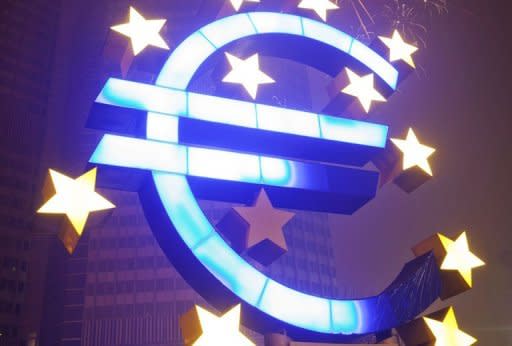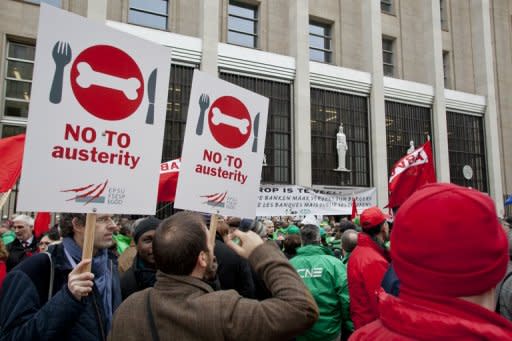OECD warns eurozone crisis stunting global recovery
Europe came under mounting pressure Tuesday to take action to boost growth as the OECD warned that the eurozone crisis has worsened and poses the greatest risk to a recovery for the global economy. On the eve of a European summit, the head of the International Monetary Fund added her voice to a chorus of calls for decisive moves after US President Barack Obama called for more coordination. European stock markets however rallied, taking hope the clamour would trigger clear action by EU leaders despite their differences, although struggling Spain saw its borrowing costs rise as it raised 2.5 billion euros ($3.2 billion) in a debt auction. In its latest report, the Organization for Economic Development and Cooperation held its forecast for global growth this year steady at 3.4 percent. But it lowered its outlook for the eurozone to a 0.1 percent contraction, urging more easing of monetary policy and euro-wide measures to boost growth. "The crisis in the euro area has become more serious recently, and it remains the most important source of risk to the global economy," OECD chief economist Pier Carlo Padoan warned. The policy forum of 34 advanced economies forecast that global growth would pick up to 4.2 percent in 2013 and 0.9 percent in the eurozone, provided it contains the debt crisis. While the eurozone gained some breathing space at the beginning of the year from the European Central Bank pumping over a trillion euros into banks, tensions have soared in recent weeks after inconclusive elections on May 6 raised the spectre of a Greek exit from the euro. There is no guarantee that Greeks will next month elect parties committed to pursuing austerity policies required under its massive international bailout and key to keeping it in the euro. "Elections in a number of euro area countries have signalled that reform fatigue is increasing and tolerance for fiscal adjustment may be reaching a limit," Padoan noted. But leftist leader Alexis Tsipras, whose Syriza party came in a surprising second in the May vote, said Greece would remain in the eurozone if the radical left were to win upcoming elections. "I do not think that a rejection of the austerity programme means that the country would have to leave the eurozone," he said, during a visit to Germany to appease those who fear his party reaching power. "We will try to find solutions at a European level and I am convinced we will be able to succeed," he said. With EU leaders meeting in Brussels on Wednesday to contemplate measures to boost growth, the OECD said "credibility and confidence would be enhanced by euro area and EU-wide measures". In particular it suggested issuing "new jointly-guaranteed government bonds to help recapitalise the banking sector and encourage the write-off of bad loans," an issue that is threatening to drag Spain into needing a bailout. Issuing so-called eurobonds has been a hot-botton issue, and Germany reiterated its opposition. "This is not a new discussion ... we think it is the wrong way," a German government source told reporters in Berlin. "This is a fundamental position and it also won't change..." he added. French Foreign Minister Laurent Fabius said differences of opinion were not fundamental and that he hoped the informal summit "would bring the points of view closer together." New French President Francois Hollande, who met with Greece's Socialist leader Evangelos Venizelos in Paris on Tuesday, has called for a growth pact to complement the EU fiscal pact, pitting him against Merkel who has pushed for euro nations to slash spending. IMF chief Christine Lagarde came out strongly on Merkel's side. "More needs to be done in relation to supporting growth, particularly by way of structural reforms, certainly not by way of suggested stimulus," Lagarde said at a press conference in London on Tuesday. In an effort to demonstrate a new resolve to address growth, the EU clinched a deal Tuesday to launch so-called "project bonds", using 230 million euros in its budget to raise billions for cross-border infrastructure schemes aimed at firing up economies. Under a deal approved by the European parliament and the presidency, that still needs agreement from the 27 member states, a pilot phase on European project bonds could be launched as soon as July. "230 million euros is not that much, but with a multiplier effect expected of between 15 and 20 times in some cases ... this is a positive start," Swedish Socialist MEP Goran Farm said. Italian Prime Minister Mario Monti meanwhile warned fiscal discipline alone is "unsustainable" without economic growth, adding that the G8 talks in Camp David in the US last weekend had given a message "that Europe will have to take into account." Obama on Monday urged Europe's leaders to get onto the same page. "What is most important is that Europe recognises this euro project involves more than a currency, it means that there must be more effective coordination" on fiscal and growth policies, he said.





